| |
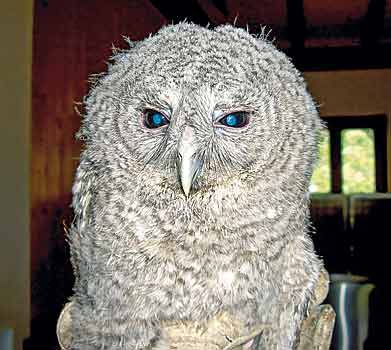
There are two wildlife rescue centres in the Province of Trento, set up by the Autonomous Province within the framework of activities provided for by provincial law 24/91. This law envisages the reintroduction of sick or wounded wild animals into their natural habitat following care and rehabilitation. In Trentino the keeping of wildlife specimens is not allowed without specific authorisation from the Forests and Wildlife Service of the Autonomous Province.
To help a wounded animal you must act in a timely and proper way, avoiding taking personal initiatives, which often have fatal consequences for any kind of wildlife. The Forests and Wildlife Service’s veterinary staff should carry out first aid, diagnosis and also decide on the best treatment.
It is most important not to cause the animal stress by touching it, moving brusquely, showing it to people or raising your voice.In most cases, fortunately, wild animals know nothing about humans and are not used to being close to us, hearing our voices, seeing our gestures and all the noises we make and consider “normal”. 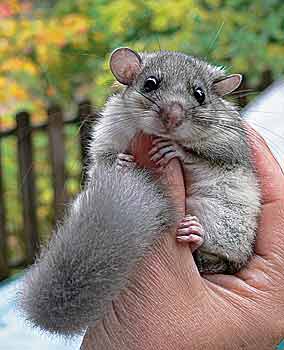
You should avoid giving medicines to them, tying them up, applying bandages or sutures. Any other handling should also be avoided, even if well-intentioned, because it may only cause damage. Wounded animals are often hungry, in a state of shock and confused, suffering and frightened, so they must be approached with caution. A wounded animal may appear harmless but, being overcome by terror, might sometimes react unpredictably.
I strongly urge you to wear gloves, preferably padded ones, to hold any kind of Predator as their claws could injure you.
It is very important not to hold birds by the wings and, particularly in the case of Birds of Prey, they should be held by gripping their thighs together to stop them from breaking limbs.
All captured birds should be immediately placed in a cardboard box, of sufficient size to allow the animal to stand up, with straw or kitchen paper in the bottom. Breathing holes should be made in the sides of the box, which should then be securely closed. Cages with metal bars are not recommended for wild birds because they can damage plumage.
While waiting for veterinary treatment, any wild animal – whether it be in a cage covered with a cloth or a cardboard box – should be kept in a very quiet place, if possible at room temperature and where it will not be disturbed in any way or for any reason.In summer time, or if the animal is thirsty, it is important to provide the animal with a bowl 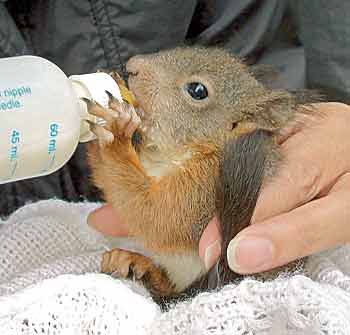 of clean water.If a car journey is necessary, the cage or cardboard container must be firmly secured and tightly closed with a belt to stop it from moving about. The car journey should be made as smooth as possible, without noises, music, hard braking and without sounding the horn. There is a separate chapter on young animals and nestlings, because they are too often moved wrongly – even though not wounded – and taken away from their mothers and other essential parental care. Sometimes parents go away to get food for their young, but this does not necessarily mean they have been abandoned. So before moving young animals or nestlings, make absolutely sure that they are wounded or abandoned. of clean water.If a car journey is necessary, the cage or cardboard container must be firmly secured and tightly closed with a belt to stop it from moving about. The car journey should be made as smooth as possible, without noises, music, hard braking and without sounding the horn. There is a separate chapter on young animals and nestlings, because they are too often moved wrongly – even though not wounded – and taken away from their mothers and other essential parental care. Sometimes parents go away to get food for their young, but this does not necessarily mean they have been abandoned. So before moving young animals or nestlings, make absolutely sure that they are wounded or abandoned.
All young animals and nestlings should be kept in warm, clean and quiet surroundings. So if you notice they have hypothermia, wrap them in woollen cloth and give them some lukewarm water with sugar if they are thirsty. A wounded young animal must be handled with great care: its body temperature – kept constant in the nest or burrow by the proximity of its family – may become dangerously low. If this happens, it must be brought back to normal, even by using hot water bottles or infrared light.
Nestlings often fall out of the nest while trying to fly and you should look in the nearby trees or bushes, because if you can find its nest it is much better to put the nestling back into it than to take it to the vet, unless it has injuries needing attention.
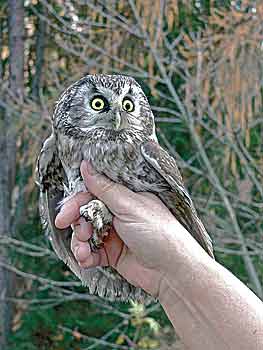 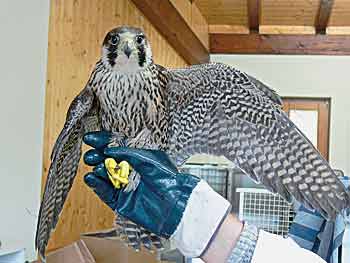 Nestlings should be fed on flour moths or honey moths, broken up and fed to the bird with tweezers. Failing that, you can give them pureed chicken, diluted in hot water, fed through a syringe without a needle, or from the edge of an ice-cream spoon. Make sure not to dirty its plumage. Alternatively, you can use minced beef. All nestlings, including grain feeding species, require lots of proteins and must not be given bread or cereals, which cause fermentation in their stomachs. Nestlings should be fed on flour moths or honey moths, broken up and fed to the bird with tweezers. Failing that, you can give them pureed chicken, diluted in hot water, fed through a syringe without a needle, or from the edge of an ice-cream spoon. Make sure not to dirty its plumage. Alternatively, you can use minced beef. All nestlings, including grain feeding species, require lots of proteins and must not be given bread or cereals, which cause fermentation in their stomachs.
Finally, if you find a wild animal that needs help, after you have alerted the recovery centre or nearest forest station, please remember to avoid making a lot of noise or behaving in a rough manner. Quiet and calm behaviour is essential.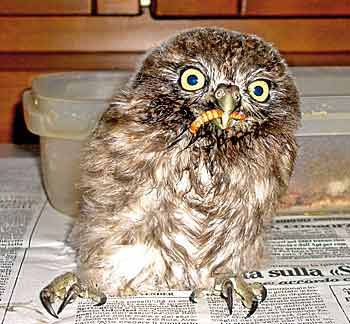
Given that 1,221 bird species are facing extinction and 812 are on the verge of doing so, I would like to make a special plea for the protection of the Swallow and House Martin, whose numbers are declining worryingly, even though they are protected species. We all know their lively song, which brightens up our spring and autumn skies, before they migrate to Africa. We also delight in watching them as they swoop about church bell-towers, the last refuge of these wonderful winged animals. Once they nested under our roofs, but nowadays it seems – although destroying their nests is strictly forbidden, especially from April to September, during the nesting season – they are not welcome, even in little mountain villages! All you need to do is fix wooden planks under the nests to stop the nestlings from falling out and keep the surroundings below the nest clean.
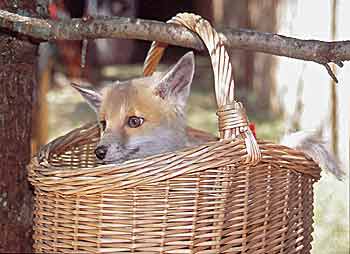 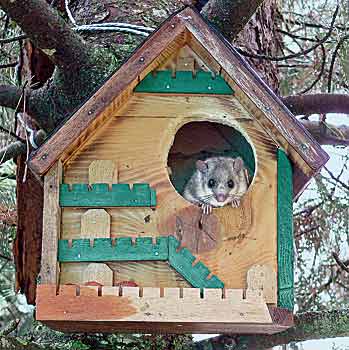
I know my messages do not have wings to reach out to the whole world, but I hope my plea will find an echo and that our ecological consciences will never fade; so the shades and sounds of nature, in their incredible bio-diversity, will continue to be enjoyed by many generations of lucky children growing up with colours and songs in their hearts.
Anyone who finds an animal that is wounded or in difficulty within the province of Trento should alert one of the following Rescue Centres at once:
| For Mammals (Ungulates, Mustelids, etc.):
Antonio Falzogher Alpine Wildlife Centre, Via Guardini 41, Casteller di Trento
Contact person: Mr. Fabio Cagol – Tel: +39 335 5440003 |
| For Wild birds:
C.R.A.S.- Wild Bird Rescue Centre, run by LIPU – Trento
Opening times: every day from 8 a.m. to 8 p.m.
Tel: 340-2491886 and 340-2424237 |
The veterinary staff working at the Casteller Alpine Wildlife Centre are the only veterinarians authorised to take care of, carry out surgery on and treat all wild mammalsof the province of Trento.
The veterinarians authorised to treat Wild Birds are:
Dr. Aurora Trentini and Dr. Mauro Bonatti
Veterinary Surgery
Via Lami, nº10 – Trento
Tel: 0461-983624 and 0461- 984299 |
The C.R.A.B. Centre in Bolzano receives wild animals and also accepts exotic animals. Tel: 199-444030
|
|
